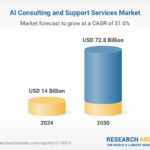In an era when artificial intelligence (AI) is reshaping industries, Deanna Strable, the CEO of Principal Financial, recognized the urgency of equipping her executive leadership team with the necessary AI knowledge. During a four-hour in-person training session held in July 2023 at the company’s headquarters in Des Moines, Iowa, Strable encountered initial resistance from her team. “Some of them said, ‘Why do we need to do this?’” she recalls. Despite this pushback, Strable emphasized the significance of C-suite leaders being informed about AI tools to enhance their integration into daily workflows.
Following this executive training, Principal Financial launched its inaugural AI literacy program in 2023, encouraging all employees to take four courses. These courses, totaling under ten hours of instruction, cover fundamentals such as AI basics, prompt writing, and the utilization of appropriate data for training large language models. Remarkably, 82% of the company’s 20,000 employees have completed at least one course, while approximately 39% have finished all four. Furthermore, AI training has been incorporated into new employee onboarding, with plans for more specialized training tailored to various job functions in 2026.
Strable notes that AI will be pivotal in achieving Principal Financial’s three main business objectives, which include expanding sales of retirement and insurance services to small- and mid-sized U.S. businesses, attracting global institutional clients, and increasing demand for individual retirement services. With AI and emerging technologies playing a crucial role in these strategies, Strable remarks, “When we think about technology, it’s not a separate discipline.”
The infusion of AI is expected to transform how Principal Financial engages with both talent and clients. With the rise of AI agents, the company acknowledges the necessity to adapt to a landscape where DIY financial planning is increasingly common. Among the AI tools already in use at Principal Financial is a generative AI assistant designed to assist with tasks such as summarization and drafting emails. Initially, this tool had only 800 active users at the beginning of 2025, while today, over 14,000 employees have access, with more than 8,000 utilizing it regularly. The ramp-up in tool usage can be directly attributed to the company’s AI literacy program.
Principal Financial is also leveraging an enterprise version of OpenAI’s ChatGPT, AI coding assistant tools utilized by the IT team, and a newly implemented AI agent for answering human resource-related inquiries. Additionally, the organization benefits from a network of 700 AI “ambassadors” across various departments to assist colleagues with any AI-related queries.
Strable, who began her journey at Principal Financial as an intern in 1990 and ascended to the CEO role in 2023, has witnessed a shift in employee perceptions regarding AI usage. “You are starting to see more and more people not just look at you with a blank face, but have some real examples of how they’ve embedded it into their personal day-to-day work,” she observes.
Principal Financial’s investment in AI training has led to a noticeable difference in employee engagement with generative AI tools compared to broader industry trends. According to a recent PwC survey of nearly 50,000 workers across 48 major economies, only 14% of employees reported using generative AI daily, while 45% had never used such technology in the past year. The statistics are even starker for AI agents, with just 6% of employees utilizing them daily and 57% never engaging with that technology.
Adapting to New Workforce Needs
As companies navigate the evolving landscape of AI, the emphasis on upskilling employees has become increasingly apparent. Daniele Grassi, CEO of technology education provider General Assembly, notes that both individual workers and organizations are recognizing the disconnect with their employees. “They are seeing that there is a disconnect with their own employees,” he states, suggesting that employees often do not embrace technological advancements.
In response, organizations are investing heavily in training programs to validate the return on their AI investments. Grassi explains that the emergence of AI has necessitated upskilling across a broader demographic than just technical professionals. General Assembly has adapted its offerings to include courses tailored for the C-suite and non-technical employees. Principal Financial’s commitment to AI literacy has alleviated some apprehension surrounding these technologies. Strable notes, “Naturally, there was a lot of fear of AI,” with employees often asking whether AI would impact their jobs. Her message is that AI will enhance productivity, suggesting that while certain roles may evolve, AI is not inherently a job eliminator.
Since the implementation of the AI literacy program in July, there has been a marked evolution in discussions within the C-suite. Executives now share insights on their personal and team usage of AI, fostering more engaging conversations. “If we wouldn’t have had the foundation, I think that wouldn’t have ever happened,” Strable concludes.
See also AI to Transform B2B Finance by 2030, Boosting Efficiency and Redefining Roles
AI to Transform B2B Finance by 2030, Boosting Efficiency and Redefining Roles Intuit Partners with OpenAI to Deliver Personalized Financial Advice through ChatGPT
Intuit Partners with OpenAI to Deliver Personalized Financial Advice through ChatGPT AI Adoption Reaches 70% in Businesses, Projected Market Growth to $72.8B by 2030
AI Adoption Reaches 70% in Businesses, Projected Market Growth to $72.8B by 2030 Maxima Secures $41M to Transform Accounting with Agentic AI Platform
Maxima Secures $41M to Transform Accounting with Agentic AI Platform Elon Musk Predicts Work Will Be Optional in 10-20 Years Due to AI and Robotics
Elon Musk Predicts Work Will Be Optional in 10-20 Years Due to AI and Robotics




























































